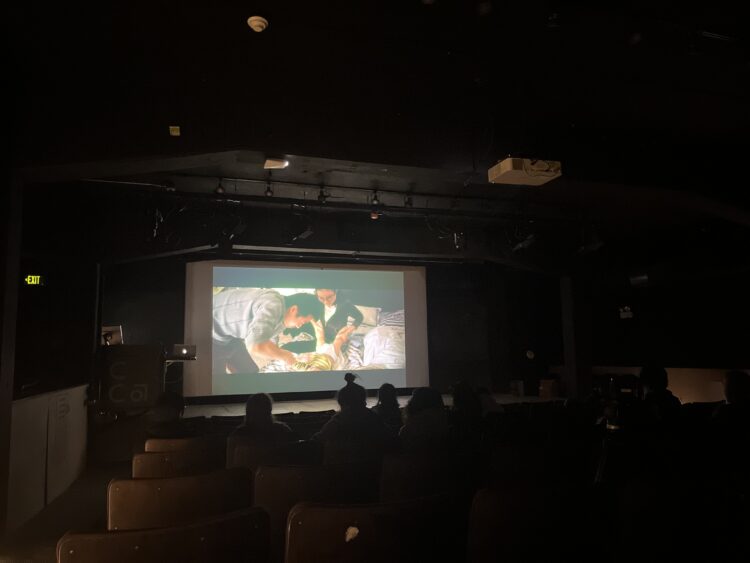Life & Death Converge in Srikanth Reddy’s Book, Underworld Lit

At the beginning of Srikanth Reddy’s new book-length poem, Underworld Lit, the main character simultaneously learns that his wife is pregnant, and that he has cancer. This convergence of good and bad news that signify life and death lead the character, a university professor of world literature, through an Inferno-like journey where academia, mistranslations, and apocalyptic and otherworldly landscapes bubble up in both dark and comedic ways. The book, Reddy’s Creative Capital Project, will be published by Wave Books on August 4.
We spoke to Reddy about his writing process, his influences, and keeping a sense of humor while facing dire circumstances.
Alex Teplitzky—Can you give me a short synopsis of Underground Lit, and tell me how it got started?
Srikanth Reddy—In the late summer of 2008, my wife and I learned that we were expecting. Three days later, I received a cancer diagnosis from the university hospital. Needless to say, birth and death were suddenly superimposed, like a sort of uncanny double-vision, in my life from then onward. To complicate things further, I was in a state of professional precarity at the time, as an untenured academic with, let’s just say, “uncertain prospects” for promotion ahead. Underworld Lit is a kind of fictionalized diary of a bad year when all of these things came together for me in mid-life, or what Dante calls “nel mezzo del cammin di nostra vita.”
Alex—The style and writing of the book is almost indescribable—mixing poetry, fiction, academic language, even a word-search puzzle! It seems like you gain inspiration from everything: from the world literature that your character teaches at a university, to the language of tests and academic journals. Specifically, what type of writing influenced you as you wrote this book?
Srikanth—Strangely enough for such personal material, the cosmic bookworm Jorge Luis Borges was probably the most important writer to me as I put together Underworld Lit. I’ve always loved how Borges opens doors onto other worlds in his fiction, and then steps through those doors, one after another, until our own world, looking back, seems as strange and unreal as myth, fantasy, or science fiction. The “narrator” of Underworld Lit dives into books about the underworlds of various cultures to escape the purgatory of his own midlife crisis, but finds that the ancient realms of the dead—in Mayan, Egyptian, or Chinese literature, for example—bear an uncanny resemblance to our modern world, with its burning rivers, its tortured populations, its monsters on thrones.
Even as my own writing became more and more “Borgesian” in this book, I found myself turning to more personal works of autofiction—Karl Ove Knausgaard’s “My Struggle” series, Rachel Cusk’s “Outline” trilogy, Claudia Rankine’s Don’t Let Me Be Lonely, and Anne Carson’s Nox, to name a few—to hold all of those underworlds together, or to put them in orbit around a self. I think that’s why so many different kinds of writing come together in this book; it’s like all of those quizzes, personal anecdotes, lecture notes, botched translations, and so on were fragments of a life about to fall apart yet still held in place by some sort of strange gravity.
Actually, now that I think about it, I hope it’s more like a picture of a life that’s about to be re-assembled, like those exploded view diagrams that can show how to put something—a bookshelf, a car engine—back together.
Alex—I’m thinking about your response to the first question, especially in light of all that’s going on. When I asked you what inspired you to start the work you mentioned two dramatic moments in your life that converged coincidentally.
I wonder what it was like, then, to write this book? I also wonder what it’s like now that you have finished it, to hold this work of art in your hands?
Srikanth—It feels a little awkward to look back on the midlife crisis narrated in Underworld Lit today, when everybody in the world is now neck-deep in a global, local, and personal crisis of their own. But it also makes me think about crisis itself, on all of its various scales, as something that doesn’t necessarily feel like it has a beginning or end, only a middle. That’s why the first line of Dante’s Inferno always feels so timeless to me: “In the middle of life I found myself lost in a forest of shadows.”
The narrator of Underworld Lit scrolls through the names of the Iraqi dead online; now I hear lists of victims of the Covid-19 pandemic on the radio every morning. The book tells a story about the precariousness of academic life; now I read bleak reports on the outlook for universities in The Chronicle of Higher Education. Life under lock down feels a little like purgatory, without beginning or end in sight. If there’s anything I feel, holding the book in my hands now, it’s a skewed sort of déja vu. I can only hope that the dim glimmers of light at the end of Underworld Lit might flicker into view for all of us someday soon.
Alex—If anything, the global catastrophe we find ourselves in today makes your book all the more urgent. We’re surrounded by tragedy, and unbelievable circumstances, just as the main character is in Underworld Lit. And yet, it’s also a comedic book. There’s so much humor in your book, and as I’m reading it, it feels necessary. How did you keep that humor throughout the book?
Srikanth—Writing Underworld Lit, I’ve come to feel that the deepest form of humor is realism. When you’re honest about how you feel about things like cancer, or parenting, or even war, I think you bump up against the absurdity and inadequacy of your own responses to those overwhelming realities. I wish I could write about my “courageous battle with cancer” like other survivors, but my own narrative was actually more of a whimpering retreat from the reality of mortal illness. That’s why the narrator of Underworld Lit continues to smoke throughout his own cancer treatment; he can’t even muster the inner resources to quit an embarrassing habit associated with his life-threatening disease. I could have left that embarrassing fact about myself out of the book, but by including it, I felt like I was coming a little closer to the reality of my situation. So being honest about things in my own life just sort of naturally produces comic effects.
That goes for writing about larger scale issues facing society, I think, because our collective responses to various challenges facing humanity are just so patently absurd when you simply describe them. You could say that satire, in many ways, is just another form of realism; any honest account of the US intervention in Iraq and Afghanistan, or of our educational system, or of our societal response to climate change, looks a lot like smoking while you have cancer. So it was almost too easy to find the humor in my material while writing Underworld Lit; the real challenge was opening up the other forms of affect—like melancholy, anger, wonder, and love—that move through us in this world-historical moment.
Alex—How has Creative Capital helped you with this project?
Srikanth—I think I can safely say that I wouldn’t have been able to write this book without Creative Capital’s support. Obviously the financial award was hugely helpful in allowing me to take some time off from teaching in order to focus on writing; my wife and I moved to Oaxaca, Mexico, for the year with our 5 year-old daughter—who makes occasional appearances, as a toddler, in the book—and I’ll always remember that window of time as one of the most important periods in my life as a writer.
But the award also ramified outward beyond the sorts of practical and financial support that one would associate with a literary fellowship. I made friends with other writers and artists (and editors and publishers) at the artist retreats that I attended; I became more confident about my work after presenting it to the enormously supportive audience of arts professionals from all sorts of disciplines and organizations at those retreats; and I’m learning a lot, now, from the new awardees I’m helping to mentor as an artist advisor for Creative Capital. Their work inspires me to start dreaming up new projects for myself as a writer—even as I send my own Creative Capital 2013 project into the world, at long last!
In the end, I think that’s the unique aspect of Creative Capital as an arts organization. They don’t simply write you a check and send you off to make your masterpiece on your own; they follow up with you, they support you in all sorts of practical and creative ways, and they celebrate and promote your work when it enters society. Now more than ever, when the arts and artists are facing such bewildering challenges, that seems to me like a model of how to help our work continue.
Purchase Underworld Lit by Srikanth Reddy on August 4, 2020.
